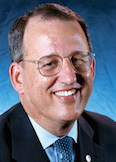A Tar Heel Family and Carolina Values
Posted on July 10, 2009Too often we wait until a colleague retires or departs to take on new challenges before we publicly acknowledge what we’ve long observed about their remarkable contributions. Happily, the recent renewal of his contract for an additional three years means Dick Baddour ’66 will continue to serve Carolina and lead UNC athletics.

Doug Dibbert ’70
Born and raised in Goldsboro to parents who emigrated from Lebanon, Dick and his brothers Phil ’64, Stephen ’69 and Neil ’76 attended and graduated from Carolina as did Dick’s wife, Lynda ’70, and their three children Allen ’93, David ’95, and Jenny ’99. By 1997, when Dick was selected by the late Michael Hooker ’69 as director of athletics, he had worked in the Office of Dean of Men, the Office of Undergraduate Admissions, as assistant dean in the law school and for 11 years as senior associate director of athletics. Dick also served more than 20 years in the Army Reserve and managed former law Dean Ken Broun’s campaign for Chapel Hill mayor. Dick’s commitment to family, understanding of Carolina’s culture and values, and his passion for his state shape how he leads Carolina’s admired and respected athletics program.
Ranked second in the Learfield Directors Cup, which measures NCAA Tournament performance for men’s and women’s sports, Carolina is the first ACC school to have played in a football bowl game, the men’s basketball Final Four and the baseball College World Series in the same season.The Tar Heels also won the women’s soccer national championship and played in the men’s soccer and women’s lacrosse championship games. Carolina has won more ACC championships than any other school, and in the past four years, 23 of 28 Tar Heel teams have qualified for NCAA postseason competition.
However, Carolina assesses athletics success more broadly than wins and championships.Whether measured by the number of student-athletes who made the ACC Academic Honor Roll, the number who earned dean’s list honors or the NCAA’s academic progress rate (measuring graduation rates), Carolina athletes excel in the classroom. This year’s men’s basketball team also won the championship based on the graduation rates of the 64 seeded teams. Five years ago, Baddour launched the Carolina Leadership Academy, a training program for student-athletes, coaches and administrators that has become a model for other schools.
While few programs consistently generate surpluses or break even, Baddour has brought financial stability to Carolina athletics, negotiating partnerships with Wachovia, Learfield Communications and Nike. With his leadership and that of Rams Club President John Montgomery and Rams Club volunteers and staff, $245 million was raised in the eight years of the Carolina First Campaign, increasing the scholarship endowment to $190 million.Working with a talented and long-serving staff, Baddour has overseen renovations and developed plans for every athletics facility — Bryson Field at Boshamer Stadium, Carmichael Auditorium, Eddie Smith Practice Facility, Finley Golf Course, Kenan Stadium, Dean Smith Center, Stallings-Evans Sports Medicine Center, the Carolina Basketball Museum and Ernie Williamson Athletics Center, among others.
As a founding member of the Knight Commission on Intercollegiate Athletics, I’ve had the opportunity to know many athletics directors. Unlike most, Baddour thinks first about the experiences of each of our more than 700 scholar-athletes. He courageously makes difficult coaching changes; he insists that all coaches be teachers and mentors on and off the courts and fields. And he can be seen on sidelines, in locker rooms and on courts with coaches and players ensuring that Carolina’s reputation for class is always maintained.
While most of his colleagues across the country limit the engagement of faculty, Baddour understands that, at Carolina, faculty oversight of athletics is a long, proud tradition; he actively invites the advice and respects the decisions of faculty. He seeks and welcomes collaborations across campus from the Board of Trustees, the College of Arts and Sciences, the Division of Student Affairs and the General Alumni Association. Instinctively, he thinks first about what is the right thing to do for Carolina — not what would best serve Carolina athletics.
When Dick Baddour enrolled at Carolina in 1962, becoming athletics director was not on his mind. But we should be grateful for his service to Carolina all these many years.We should particularly appreciate his selfless, enlightened leadership and insist that his reflection of the “Carolina way” be the standard whenever his successor is chosen.
Yours at Carolina,

Douglas S. Dibbert ’70
Postscript: Although they graduated from nearby high schools the same year, unlike Dick Baddour, when Bernadette Gray left Washington, N.C., she didn’t come to Chapel Hill. Happily, in 1971 she came to UNC as a faculty member in the psychology department. Her career has been marked by academic and administrative achievement, serving as dean of the College of Arts and Sciences before becoming executive vice chancellor and provost. She is the fifth of the past six UNC provosts to become a president or chancellor as she leaves to serve as chancellor of the University of Kansas. She has earned our admiration, and we wish her well.
